In a recent speech in North Carolina, former President Donald Trump hinted at the possibility of expanding tariff plans, signaling a potential shift in trade policy. This move could have significant implications for both domestic industries and international relations.
Tariffs are taxes imposed on imported goods, intended to protect domestic industries by making foreign products more expensive and less competitive in the domestic market. Throughout his presidency, Trump utilized tariffs as a key tool in his trade policies, particularly in the context of the ongoing trade war with China. While the effectiveness of these tariffs in achieving their intended goals remains a topic of debate, there is no denying that they have had far-reaching consequences.
Expanding tariff plans could potentially benefit certain industries, particularly those that have been struggling to compete with cheaper foreign imports. By making imported goods more expensive, tariffs can level the playing field for domestic producers, providing them with a competitive advantage. This could lead to increased production and job creation within the country, boosting the overall economy.
However, it is essential to consider the potential drawbacks of expanding tariff plans. Higher tariffs often lead to retaliatory measures from trading partners, triggering a cycle of escalating trade tensions that can harm both economies involved. In the past, Trump’s aggressive approach to tariffs sparked criticism from allies and adversaries alike, straining diplomatic relations and disrupting global supply chains.
Moreover, tariffs ultimately result in increased costs for consumers, as higher prices for imported goods are passed on to the end-users. This can disproportionately impact low-income households, who spend a higher percentage of their income on basic necessities. Additionally, certain industries that rely heavily on imported raw materials or components may face challenges in maintaining their competitiveness if tariffs drive up their production costs.
The decision to expand tariff plans requires careful consideration of these complex factors. While protectionist measures can offer short-term benefits to certain sectors, the long-term consequences must be weighed against the potential risks of trade wars and economic instability. Finding a balance between protecting domestic industries and fostering international cooperation is crucial in navigating the complexities of modern trade relations.
In conclusion, Trump’s openness to expanding tariff plans raises important questions about the future direction of US trade policy. As debates continue on the merits and pitfalls of protectionist measures, it is essential to approach these issues with a nuanced understanding of their implications for both domestic and global economies. Balancing the interests of different stakeholders and pursuing cooperation where possible will be key in shaping a trade policy that promotes sustainable growth and prosperity for all.

